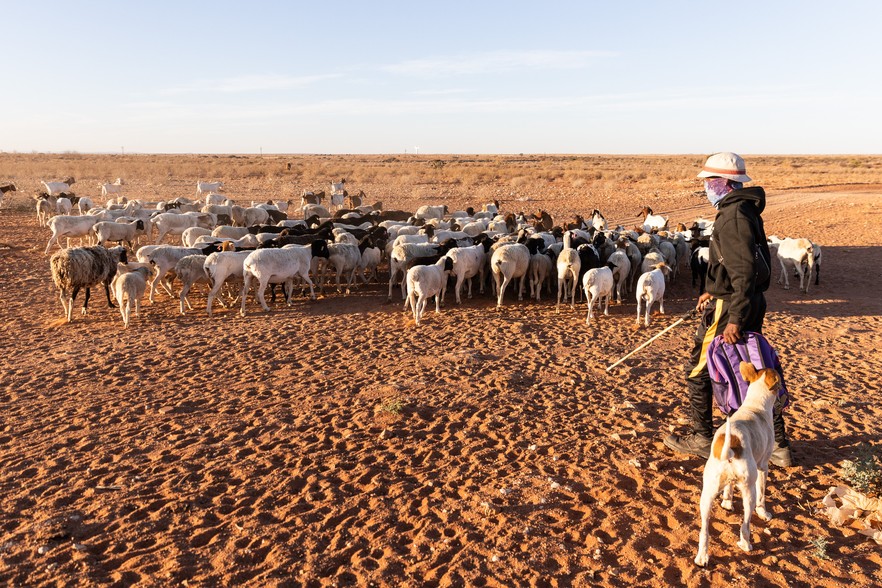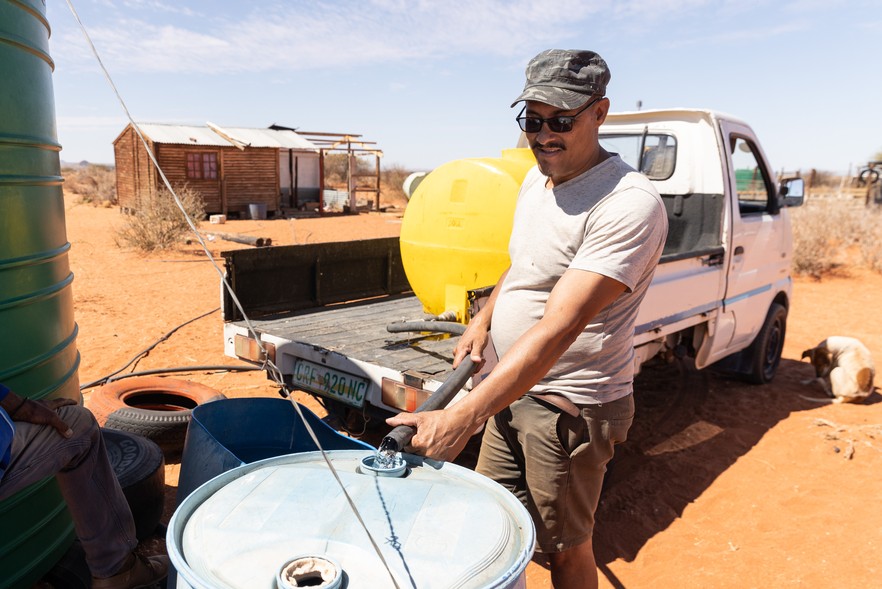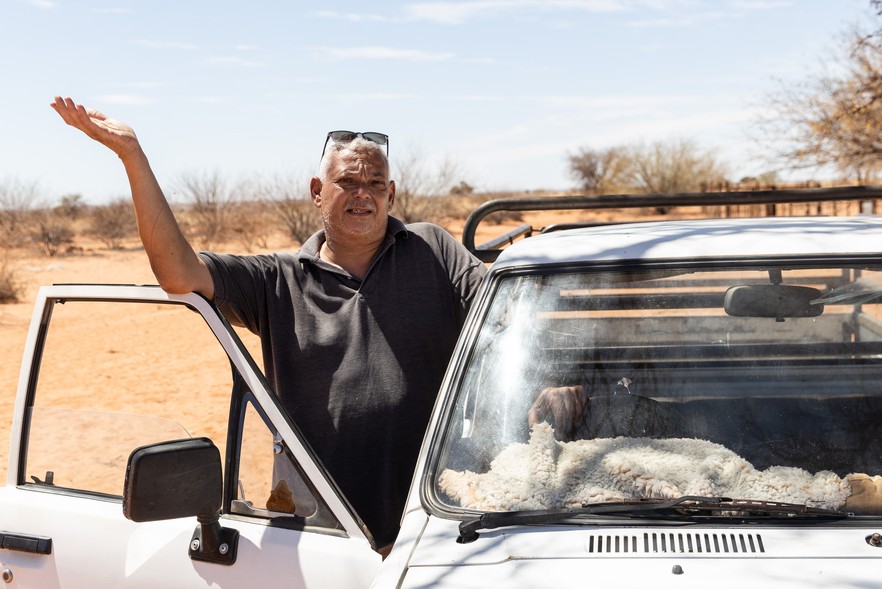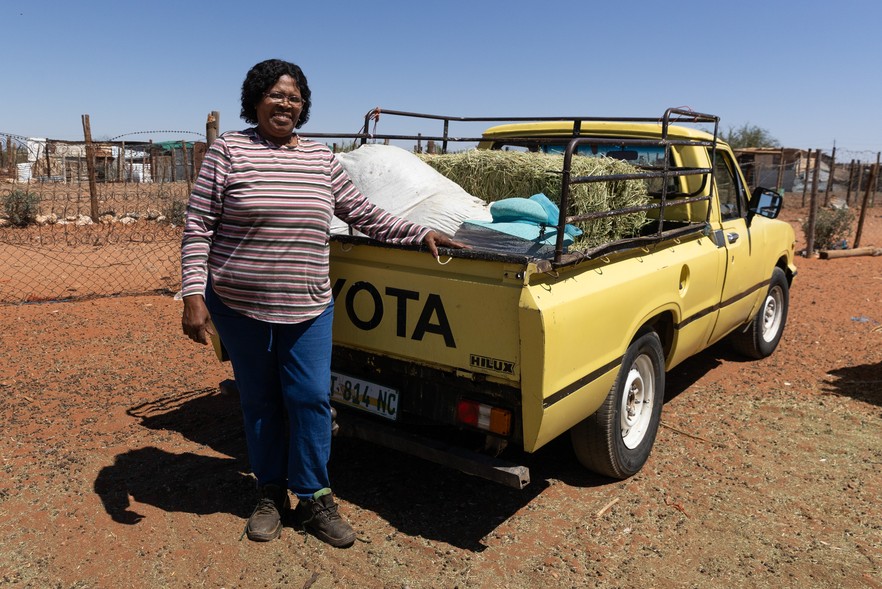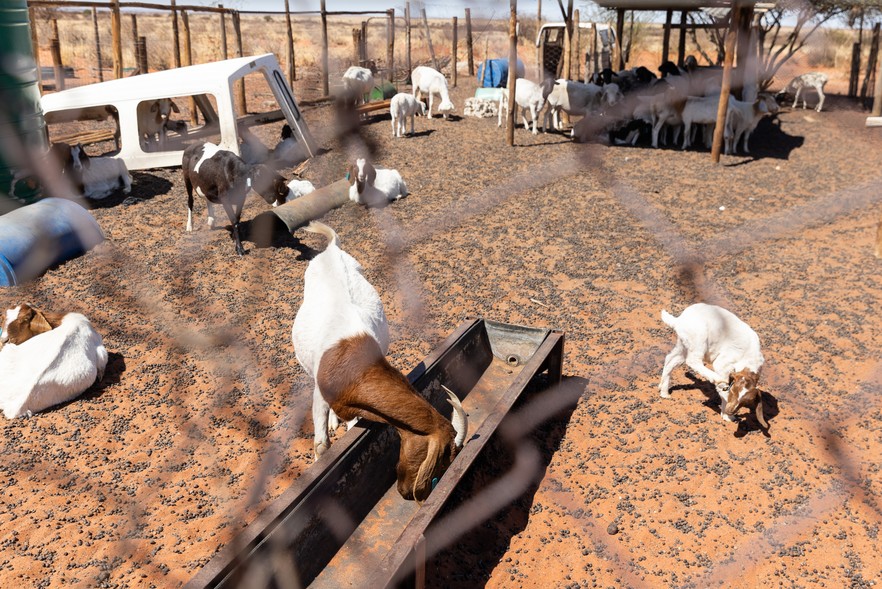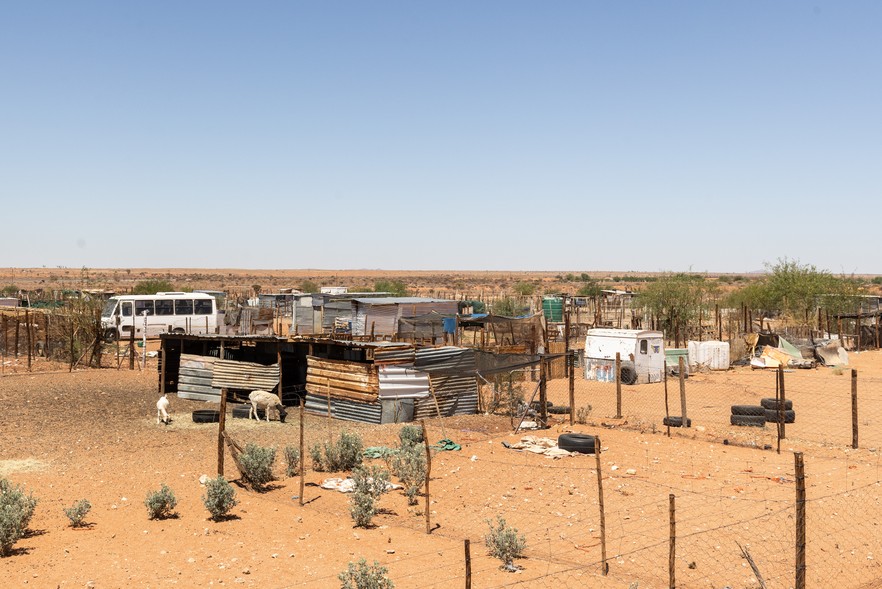Upington farmers are desperate for water
They are receiving little help from the municipality
A shepherd lets sheep out to graze in the early morning. The commonage in Upington is hot and dry. There is very little for livestock to graze.
- Small-scale livestock farmers in Upington using municipal owned common land face severe water and grazing shortages.
- The farmers pay fees but say they receive minimal support as they struggle with water scarcity and frequent livestock theft.
- A 2022 draft policy to empower emerging farmers and manage the common land has never been implemented.
Small livestock farmers on common land in Upington are desperate for water. The farmers’ kraals and grazing areas are on municipal commonage in this hot and arid town south of the Kalahari desert.
The Hondejag commonage lies between the townships of Rosedale and Paballelo. It is owned by the Dawid Kruiper Municipality, and according to draft municipal policy, which dates from 2022, it is to be used for the “empowerment of emerging farmers within the municipal area” and the “alleviation of poverty by making land available to poor residents”. This policy has yet to be applied.
Little grows on the sandy plains. And most of the 80 or so farmers on the commonage do not have access to water at their kraals for sheep, goats and cattle. There are communal water tanks supplied by the municipality, but the farmers say there is little water in the tanks.
Andre van Wyk, who farms on the Rosedale side of the commonage, said that the pressure in the water tanks is very bad and water only dribbles out, if at all. It is worst on hot days, he said.
“We are dependent on the vegetation,” said Van Wyk.
Andre van Wyk fills his tank with water that he had to fetch from home. He said that water pressure is very low.
Farmers have resorted to fetching water from their homes and carting it daily with their trucks to their thirsty livestock.
Rosedale farmers are also battling frequent livestock theft. There is no fencing.
Carl Stevens says he lost about 64 of his livestock in January.
They were either stolen or just lost, said Stevens. “My heart is sore.”
Farmer Frankie Koopman wondered how the municipality expected them to farm enough to export and make a livelihood.
“It is any person’s desire to make your farming successful, so it can provide for you. No one wants to farm just for the sake of it,” he said.
Carl Stevens said that over 60 of his livestock were either stolen or lost in January.
On the Paballelo side, farmers’ kraals are lined up next to one another and they are cramped. When the farmers were moved here they were told it was only temporary. That was in 2013.
“Look at how many people are here. There is no grazing here anymore. It is very cramped. There is nothing here anymore,” said farmer Paulina September.
Overgrazing and lack of water makes it difficult for the emerging farmers to feed their livestock. Yet they pay a fee to the municipality for each animal for use of the commonage.
“For eight months I haven’t had water here. There is no water,” said farmer Mangaliso Mashiyi. “Can they not take us somewhere where there is wetter ground?”
Mashiyi said the day they have access to water, they will have no trouble paying their bills.
Maria Lankalebalela has to transport bales of feed as there isn’t enough food for the animals to graze on. She says that she is also struggling with access to water.
Aaron Ranayeke, a representative of the small-scale farmers at the Trust for Community Outreach and Education, said the draft commonage policy from 2022 would give the farmers more power to make decisions about the land. But the municipality had delayed implementing it.
“The municipality is running away from that power,” said Ranayeke.
The draft policy sets out a framework for the management of the commonage through a “Commonage Committee”. It is to consist of commonage users, representatives of the municipality and the departments of agriculture, water and SAPS. This committee will make recommendations to the municipal council.
Every commonage is also to have a management committee with emerging farmers as members. The management committee would be responsible for managing the commonage and reporting to the Commonage Committee.
There isn’t always water available for the animals when they return from grazing in the field.
The acting district manager of the Northern Cape Department of Agriculture’s directorate for Agricultural Producer Support and Development, Andres Majaja, said that the management of the commonage is the “sole responsibility” of the Dawid Kruiper Local Municipality.
Majaja said the last commonage committee meeting for Dawid Kruiper Municipality was held on 14 February 2014. A meeting to revive the Commonage Committee was held on the 19 September 2024, but only two farmers attended the meeting, and “the meeting didn’t reach a desired outcome”.
Ranayeke said the reason the meeting was badly attended was because the municipality had postponed meetings with the farmers so many times.
Another meeting, where farmers were due to address the council, was cancelled. The farmers were told this when they arrived at the municipal buildings.
Majaja said the fees farmers are paying to the municipality are for the use of grazing. The funds should be applied to maintain fences and stock water systems on commonage farms.
“On municipal grazing land, there are no sustainable agricultural management practices followed, and these grazing areas tend to be the first to show signs of drought when conditions are unfavourable,” he said.
Dawid Kruiper municipality spokesperson Patrick Williams promised to respond to GroundUp’s questions but had not done so at the time of publication, despite numerous follow-ups.
About 80 small-scale farmers live on commonage land in Upington. The area is hot with very little rain.
Support independent journalism
Donate using Payfast

Don't miss out on the latest news
We respect your privacy, and promise we won't spam you.
Next: Reading is Kwaai: high school teacher starts mobile library for learners
Previous: Protest opposite Holocaust and Genocide Centre in Cape Town: call for ceasefire in Gaza
Letters
Dear Editor
I believe that the Department of Agriculture should manage this project. The ANC use this venture to buy loyalty from voters.
This not a core function of local government.
The municipality has staff and transport expenditure to manage this project. Households subsidise these farmers. The farmers are in arrears to the tune of more than R2-million. Overgrazing is clearly happening. Stock farming on the commonage is not sustainable.
© 2024 GroundUp. This article is licensed under a Creative Commons Attribution-NoDerivatives 4.0 International License.
You may republish this article, so long as you credit the authors and GroundUp, and do not change the text. Please include a link back to the original article.
We put an invisible pixel in the article so that we can count traffic to republishers. All analytics tools are solely on our servers. We do not give our logs to any third party. Logs are deleted after two weeks. We do not use any IP address identifying information except to count regional traffic. We are solely interested in counting hits, not tracking users. If you republish, please do not delete the invisible pixel.

